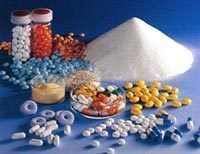Disodium Calcium Edetate
375 INR/Kilograms
Product Details:
- Structural Formula C10H12CaN2Na2O8
- Boiling point 613.00 to 615.00 C
- Smell No Smell
- HS Code 29224985
- Melting Point 237-245 C
- Solubility slowly soluble in water
- Shelf Life 24 Months
- Click to View more
X
Disodium Calcium Edetate Price And Quantity
- 375 INR/Kilograms
- 25 Kilograms
- 400.00 - 450.00 INR/Kilograms
Disodium Calcium Edetate Product Specifications
- Edetate calcium disodium
- No Smell
- Edetate calcium disodium is a chelating agent that can remove a heavy metal from the blood. Edetate calcium disodium is used to treat lead poisoning. Edetate calcium disodium is a metal ion chelator used to reduce blood concentrations and depot stores of lead from the body. It is given by slow injection into a vein or into a muscle.
- 613.00 to 615.00 C
- C10H12CaN2Na2O8
- 62-33-9
- 24 Months
- 98%
- slowly soluble in water
- 29224985
- 237-245 C
- Pharmaceutical Intermediates
- 8.0 to 9.0
- 200-529-9
- 5 m
- Powder
- 8,7 - 11,4 %
- Salty
- Medicine Grade
- C10H12CaN2Na2O8
- NA
- 374.27 Grams (g)
- Edetate calcium disodium anhydrous
- white crystalline powder
- Room Temperature
Disodium Calcium Edetate Trade Information
- Mumbai
- Letter of Credit (L/C) Letter of Credit at Sight (Sight L/C) Cash Advance (CA) Days after Acceptance (DA) Cash in Advance (CID)
- 25 Kilograms Per Day
- 7 Days
- Yes
- Free samples are available
- drum packing
- Western Europe Australia North America South America Eastern Europe Middle East Central America Asia Africa
- All India
- ISO / GMP
Product Description
In the blood, edetate calcium disodium removes heavy metals as a chelating agent. Lead poisoning is treated with edetate calcium disodium. There may be other uses that not listed in this medication guide.
Disodium Calcium Edetate Properties:
- CAS Number: 62-33-9
- Name: Calciate(2-),[[N,N'-1,2-ethanediylbis[N-[(carboxy-kO)methyl]glycinato-kN,kO]](4-)]-, sodium (1: 2), (OC-6-21)-
- Superlist Name: EDTA calcium disodium
- Formula: C10H12CaN2Na2O8
- Molecular Weight: 374.30
- Deleted CAS: 100333-49-1,108703-54-4,12002-29-8,12558-50-8,1282-71-9,1288-07-9,19067-42-6,35-00-7,39208-14-5,50322-17-3,5297-15-4,5639-01-0,56532-88-8,57131-51-8,61864-74-2,63042-69-3,68162-45-8,69843-95-4,74011-06-6,7732-93-6
- Synonyms: Calciate(2-),[(ethylenedinitrilo)tetraacetato]-, disodium (8CI);Calciate(2-),[[N,N'-1,2-ethanediylbis[N-(carboxymethyl)glycinato]](4-)-N,N',O,O',ON,ON']-,disodium, (OC-6-21)-; Calcium disodium Versenate;Calcium disodium ethylenediaminetetraacetate;Calcium sodium EDTA;Calcium sodiumedetate;Calcium titriplex;Disodium calcium edetate;Disodium calcium ethylenediaminetetraacetate;Disodium[(ethylenedinitrilo)tetraacetato]calciate (6CI);(Ethylenedinitrilo)tetraaceticacid calcium disodium salt;Adsorbonac;Calcium disodium (ethylenedinitrilo)tetraacetate;Calciumdisodium EDTA;EDTA disodium calcium salt;Edathamiol calcium disodium;Edetamine;Edetatecalcium;Edetate calcium disodium;Edetic acid calcium disodium salt;Edtacal;Ethylenediaminetetraacetic acid calcium disodium salt;Glycine,N,N'-1,2-ethanediylbis[N-(carboxymethyl)-, calcium sodium salt (1: 1: 2);
- EINECS: 200-529-9
- Boiling Point: 614.2 °C at 760 mmHg
- Flash Point: 325.2 °C
- Appearance: White powder
How does it work?
Calcium disodium EDTA is a chelating agent. Essentially, it binds to metals to prevent them from participating in chemical reactions which might result in discoloration or flavor loss.
Applications Or where it is used:
A metal ion chelator such as edetate calcium disodium reduces blood concentrations of lead. It was approved by the FDA on 16 July 1953.
How to use:
An injection of edetate calcium disodium is administered into muscles or as an infusion into veins. This injection is administered by a healthcare professional. It takes up to 12 hours to inject it into a vein through an IV infusion.
Side effects:
- Pain where the medicine was injected
- Fever and chills
- Tiredness and general ill feeling
- Muscle/joint pain
- Headache and tremors
- Nausea and vomiting
- Thirst or loss of appetite
- Sneezing, stuffy nose, watery eyes
- Mild skin rash
Warnings and precautions while using this product:
Edetate calcium disodium shouldn't be administered if you have a restricted urinary tract or kidney disease, or if you cannot urinate. In addition to its toxic effects, it can cause life-threatening medical problems. If you experience memory problems, trouble concentrating, behavioral changes, mood changes, or changes in your mental state, call your doctor right away.
Tell us about your requirement

Price:
Quantity
Select Unit
- 50
- 100
- 200
- 250
- 500
- 1000+
Additional detail
+91
Email










 : nilesh.sheth70
: nilesh.sheth70
